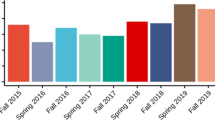Abstract
In this article, I advocate that university education has at its core a mission to enable its communities of scholars (staff and students) to make judgements on what can be trusted, and that they, themselves, should be truth-tellers. It is about society being able to rely upon academic statements, avoiding deliberate falsehoods. This requires trust in oneself to make those judgements; an obligation to do so; and the courage to speak out when such judgements might be unpopular, risky or potentially unsafe. I suggest it should be a duty placed on academics to be truth-tellers and to educate potentially gullible others in what it is to have worthy and reliable self-trust in their own judgements.
Similar content being viewed by others
Notes
His opening line of that article is ‘I take education to be a moral business’ (1989: 33).
I focus on teaching as an example but much the same applies in research where an obligation of truth precedes the right for research findings to be taken seriously.
References
Advertising Standards Authority, (2017) Universities: Comparative claims https://www.asa.org.uk/advice-online/universities-comparative-claims.html
Arendt, H. (1972). Lying in politics, in The Crisis of the Republic. New York: Harvest Books.
Barnett, R.A. (1997). Higher Education: A critical business. Buckingham: SRHE and Open University Press.
Bird, S.J. (2013). Public trust and institutions of higher learning: Implications for professional responsibility. London: Portland Press, http://www.portlandpress.com/pp/books/online/wg86/086/0025/0860025.pdf
Blenkinsop, S., & Waddington, T. (2014). Self-deception in the classroom: Educational manifestations of Sartre's concept of bad faith. Educational Philosophy and Theory, 46(14), 1–11.
Bowl, M., McCaig, C., & Hughes, J. (2018). Equality and differentiation in Marketised higher education. Cham: Palgrave.
Brown, R. (2017). The inequality crisis. Bristol: Policy Press.
Conroy, J.C., & Smith, R. (2017). The ethics of research excellence. Journal of Philosophy of Education, 51(4), 693–708
Curzon-Hobson, A. (2002). A pedagogy of trust in higher learning. Teaching in Higher Education, 7(3), 265–276.
Department of Education (2017) Graduate Outcomes (LEO): Subject by Provider, 2016 to 2017 https://www.gov.uk/government/statistics/announcements/graduate-outcomes-leo-subject-by-provider-2016-to-2017 (accessed 1.8.2018).
Ferriss, L. (2016). Post-truth and chaos. The Chronicle of Higher Education, 63(17), B2–B2.
Foucault, P. (2010). The government of self and others. Basingstoke: Palgrave Macmillan.
Furedi, F. (2016). What happened to the university? London: Routledge.
Harsin, J. (2015). Regimes of posttruth, postpolitics, and attention economies. Communication, Culture & Critique, 8(2), 327–333.
Independent Reviewer on Social Mobility and Child Poverty (2012) University Challenge: How Higher Education Can Advance Social Mobility https://assets.publishing.service.gov.uk/government/uploads/system/uploads/attachment_data/file/80188/Higher-Education.pdf (accessed 1.8.2018).
Jameson, J. (2012). Leadership values, trust and negative capability: Managing the uncertainties of future English higher education. Higher Education Quarterly, 66(4), 391–414.
Kennedy, D. (1997). Academicuty. Cambridge, MA: Harvard University Press.
Olafson, F. A. (1998). Heidegger and the ground of ethics. Cambridge: Cambridge University Press.
O’Neill, O. (2002). A Question of Trust. BBC Reith lectures. Cambridge: Cambridge University Press.
O’Neill, O. (2005). The dark side of human rights. International Affairs, 81(2), 427–439.
O’Neill, O. (2013). Intelligent accountability in education. Oxford Review of Education, 39(1), 4–16.
Peters, M. (2003). Truth-telling as an educational practice of the self: Foucault, parreshia and the ethics of subjectivity. Oxford Review of Education, 29, 207–223.
Peters, M. (2015). The history and practice of lying in public life. Review of Contemporary Philosophy, 14, 43–56.
Peters, M. (2017). Education in a post-trust world. Educational Philosophy and Theory, 49(6), 563–566.
Peters, M. (2018). Post-truth, fake news viral modernity and higher education. Singapore: Springer.
Rider, S. (2018). On knowing how to tell the truth. In Post-truth, fake news viral modernity and higher education (pp. 27–42). Singapore: Springer.
Sockett, H. (1989). A moral epistemology of practice? Cambridge Journal of Education, 19(1), 33–39.
Tierney, W. G. (2006). Trust and the public good. New York: Peter Langer.
Weil, S. (1953). The need for roots: A prelude to a declaration of duties toward mankind. London: Routledge.
Williams, B. (2002). Truth and truthfulness. New York: Princeton University Press.
Author information
Authors and Affiliations
Corresponding author
Rights and permissions
About this article
Cite this article
Gibbs, P. Why academics should have a duty of truth telling in an epoch of post-truth?. High Educ 78, 501–510 (2019). https://doi.org/10.1007/s10734-018-0354-y
Published:
Issue Date:
DOI: https://doi.org/10.1007/s10734-018-0354-y




